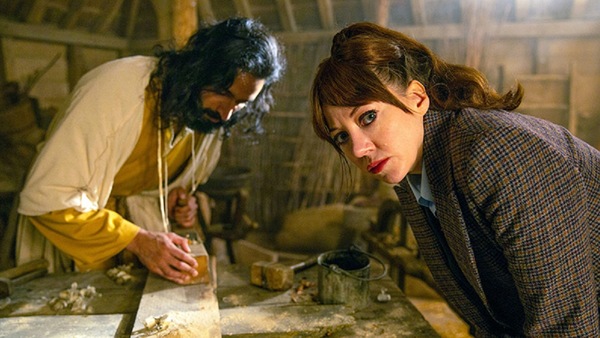Newsletter: You've Been Cunk'd! A Savant Skewers History, Hilariously
Depending on how you view it, Cunk On Earth is either the most brilliant take on world history, or — as it seemingly wants us to believe — the stupidest.

Last Updated: 03.53 PM, Mar 30, 2023
This column was originally published as part of our newsletter The Daily Show on March 30, 2023. Subscribe here. (We're awesome about not spamming your inbox!)
***
“Were numbers worth less back in ancient times?”
“Which was more culturally significant: the Renaissance or ‘Single Ladies’ by Beyonce?”
“What is it about religion that can win us over so unexpectedly? Why do humans need to believe in something bigger than ourselves? Is it so we don’t feel quite so fat?”
THESE ARE JUST a few of the questions that distinguished academics and historians must answer — with a straight face — on the BBC-Netflix mockumentary Cunk on Earth. Who has put the interviewees in such an awkward position? The clueless but curious Philomena Cunk. The character was conceptualised as a talking head by Charlie Brooker on his satirical news show Weekly Wipe and brought to life by comedian Diane Morgan. In the 10 years since she made her debut, Cunk has enlightened us, with supremely confident ignorance, on the enduring significance of Shakespeare, the true meaning of Christmas, and the complicated history of the UK.
This time around, Cunk takes us on a tour from cavemen times to our streaming age. Human history gets a zany reappraisal. Julius Caesar was “the most notorious Roman until Polanski”. Egyptian hieroglyphics were old-timey “emojis”. Mummification wasn’t too different from the spa treatment that Gwyneth Paltrow gets every week. Christ being nailed to a cross was “a great logo...for his long-term campaign”. The Dark Ages stymied human progress, putting a brake on 5G rollout for centuries. By finding inexact modern equivalents to past events, Cunk on Earth revels in the absurdities of history and reveals how relative our perception of it is.
In the broadest terms, our reconsidering of the past ends with two opposing judgements. One contends our ancestors were primitive, backward, dumb brutes who got smarter with each invention: wheel, printing press, antibiotics, motor vehicles, contraceptives, feminism, avocado toast and the search engine. The other contends we have only got stupider despite having all the knowledge we need in the palm of our hands. Bear in mind there are people who still insist the Earth is flat, people who deny the scientific consensus on climate change, and people who don’t want to get vaccinated even if doing so could save their lives. No vaccine for stupidity has been developed yet. In conflating the two perceptions of our past, Cunk on Earth finds stupidity to be the defining characteristic of the human condition. The show draws its humour from the tension between the perceived sincerity of history and the purposeful subversion of stupidity.

Comedy lives and dies by its context. A mockumentary like Cunk on Earth lives and dies just as much by its concept. The concept is incredibly simple: Cunk poses pundits the most bizarre questions with a false fact, an incorrect pronunciation or a malapropism; the pundits look to correct and seek to clarify; hilarity ensues. Between posing bizarre questions and making outrageous remarks, she segues into anecdotes about her uncle Steve’s Instagram account and her mate Paul’s many accidents. In each episode, a particularly droll segue sees her play up the cultural impact of Technotronic’s dance anthem “Pump Up the Jam”, the music video of which is subtitled with made-up facts like “this song is the national anthem of Canada”.
When Cunk walks around historical sites or talks to experts, she cuts a figure as self-assured as Sir David Attenborough. Calling herself a “landmark Documentary Presenter,” she attempts to capture the same mannered erudition of her more serious peers. The matter-of-factness of her line delivery almost makes you forget she is a fictional alter-ego, not an actual documentarian. Morgan absolutely commits to the deadpan humourist act, finding a sweet spot between mindfulness and obliviousness. The tweed jackets we so often find her wearing sell us on the idea of Cunk as an everywoman thrust into a position of intellectual authority. We see self-doubt seep in on occasion, like when her misattribution of the quote “dance like no one is watching” to Aristotle is corrected. “My confidence is quite brittle at times,” she admits at one point. “I know I come across as quite confident, but sometimes when I’m talking to experts, I worry that, you know, I might come across as a bit stupid.” We see the horror of reality seep in as well. When she learns nuclear weapons exist to this day, she struggles to hold back her tears in shock like a child being told for the first time about the senseless and indiscriminate destruction wreaked on Hiroshima and Nagasaki.
Though the experts are in on the joke, the interviews don’t come off as overly scripted and allow for a degree of spontaneity. Ashley Jackson, a professor of imperial and military history at London’s King’s College, even yields to discussing Russian vegetables when Cunk accuses him of “mansplaining” after an enquiry about the “Soviet Onion”. Cunk doesn’t blindside interviewees, like Ali G or Borat. The joke is very much on her, not the experts. But in their exchanges, she manages to draw out odd insights. When she insists “the brain is full of pipes” to Cambridge professor Douglas Hedley, he uses her factual inaccuracy to explain the analytic–synthetic distinction in philosophy. When she asks him why Jesus didn’t do anything to prevent an accident that ended up injuring her friend Paul, he reveals she has put forth a question about the very nature of God — one that has been put forth more persuasively by the likes of Epicurus and David Hume.
History omits as much as it reveals. An ignorance of it serves a function of illumination here. Starting from a place of ignorance allows Cunk to stumble upon truths. On the Crusades, she remarks, “Whether or not they think he (Christ) actually was the son of god who performed miracles like walking on wine or making a deaf man see, they all agree he preached tolerance and forgiveness, a message so important, his most ardent followers would eventually start killing anyone who didn’t want to hear it”. On the men of God who helped spread Christianity: “The missionaries were known for their position, which was that the big man, God, was on top and the rest of us had to lie back and take it”. Women securing the right to vote in 1920 meant “finally, women could choose which man would tell them what to do”.

Such turns of phrase turn stupidity on its head. When Cunk calls the guillotine “the most humane way to decapitate someone in front of a jeering crowd”, she is describing how a sickening spectacle of death was deployed as a tool in the spectacle of power. Her ignorance feels so sincere that it takes on a sublime logic of its own. When she wonders if pyramids are that shape to stop homeless people from sleeping on them, she is making a point, inadvertently, about a chronic societal failure.
There is a reflexive streak that runs through the show. “It’s hard to believe I’m walking through the ruins of the first ever city,” she says before revealing: “I’m not. That’s in Iraq, which is miles away and fucking dangerous. But the remains of it look pretty much like this, so you’d never know I wasn’t actually there if I wasn’t telling you now by accident.” As with the incorrect factoids she serves, this deception acts as a warning against falling for misinformation and readily believing everything we see on TV. In Episode 2 “Faith/Off”, Cunk urges Kate Cooper, a professor of history at the University of London, to look at the camera and refer to Jesus as the “first celebrity victim of cancel culture” so it would make for a catchy snippet in the promos — in the same way flashy headlines today obscure the facts.
In an interview with composer and professor Shirley Thompson, Cunk asks if the “lyrics” of Beethoven’s Fifth Symphony repeat the word ‘dumb’ as a “dig at his audience”. Cunk’s digs are at mankind itself. The history of human civilisation is the history of progress and regress, of art and atrocities, of reason and stupidity. In Dostoyevsky’s The Brothers Karamazov, Ivan explains to his younger brother Alyosha: “The stupider, the more to the point. The stupider, the clearer. Stupidity is brief and guileless, while reason hedges and hides. Reason is a scoundrel, stupidity is direct and honest.” This seems to be the guiding principle of Cunk on Earth.
Between the page and the screen, we have always had a loveable idiot serving as a foil to the pretentious, curbing condescension, exposing lies and proclaiming the odd truth. We have had Homer Simpson. We have had Cosmo Kramer. We have had Todd Chavez. Now we have Philomena Cunk — the idiot for our current moment. To borrow a popular headline template these days, this is Cunk’s Earth and we’re all just living in it.
